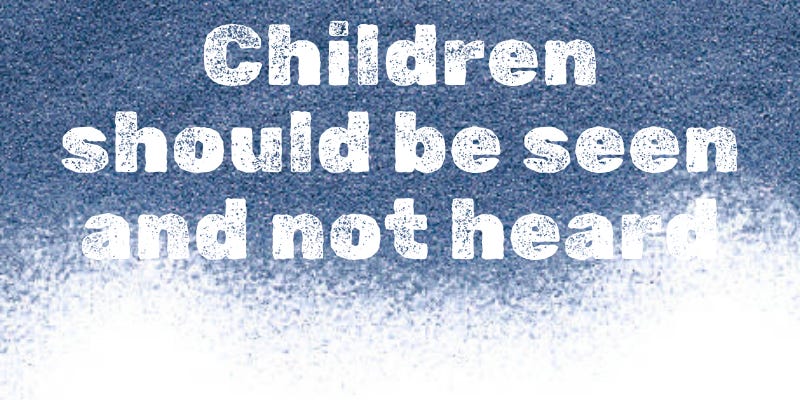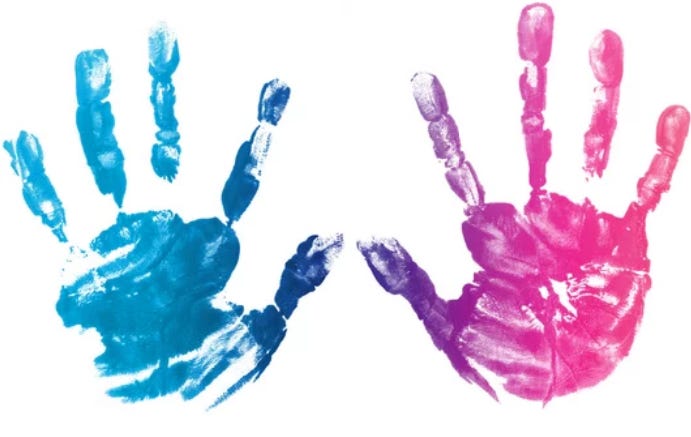What goes without saying
A new series of conversations, with phrases that might know more than we think
We assume that we know what common sayings and idioms mean. We've heard them a million times, so often that they've become background noise. They’ve been filed away either as simple truths or outdated wisdom.
But what if these phrases are more than meets the eye, and maybe they’ve been quietly pointing toward something deeper all along?
What if the sayings that feel most familiar, or most uncomfortable, are actually doorways into understanding the space between words, the quality of presence, the field that's always listening? Even the most ordinary phrases can carry the most extraordinary invitations.
There’s no right or wrong here, just some explorations into what else might also be true, in the layers we haven't noticed yet. Sometimes wisdom hides in plain sight, simply waiting for us to lean in and really listen.
~
“Children should be seen and not heard”
A conversation…
Modern Reader: Are you serious? That's the most outdated, oppressive thing I've ever heard. Children have voices! They have rights! They deserve to be heard!
The Phrase: (quietly) I didn't say they don't deserve anything, I said they should be seen.
Modern Reader: That's not the point! You're telling them to be silent, to be invisible, to be unimportant...
The Phrase: Invisible? I said seen. Really seen, not performed at, not talked over, not turned into entertainment for adults who've forgotten how to simply... be with someone.
Modern Reader: But... not heard? That's silencing them!
The Phrase: Is it?
…
…tell me, when a child runs to show you a drawing, what happens when you immediately start asking questions? "What is it? What colour should we make the sky? Is that a house or a car?"
Modern Reader: I'm... engaging with them, showing interest.
The Phrase: Or are you turning what’s theirs into your conversation?
…
…When I was spoken, it wasn't because children's voices didn't matter. It was because adults had forgotten how to receive them.
Modern Reader: I don't understand.
The Phrase: Have you ever watched a child who feels truly seen?
…they don't need to perform. They don't need to explain themselves into existence.
They just... are.
Present and whole.
And when we rush to make them speak, when we fill every pause with our questions and observations, whose need are we really meeting?
Modern Reader: Well... I want them to know I care...
The Phrase: And what if caring looked like spaciousness instead of interrogation? What if being heard wasn't about having your words received, but about having your being felt?
Modern Reader: (hesitating) Hhmmmm. But, surely children need to express themselves...
The Phrase: Of course they do. Although have you noticed what happens when they're not required to? When there's no pressure to perform childhood for the adults in the room?
Watch a child in a garden when no one's asking them to explain what they're doing. Listen to siblings playing when they've forgotten grown-ups are nearby.
That's when they're most themselves.
Modern Reader: So you're saying they shouldn't speak at all?
The Phrase: I'm saying maybe the deeper question isn't whether they should speak, but whether we've created space where their authentic expression can emerge... or whether we've filled all the air with our own need to hear ourselves reflected back.
Modern Reader: (softly) I think... I think… I er, I interrupt my girls a lot.
The Phrase: That’s not because you don't love them, but because you've forgotten that love sometimes sounds like silence.
Modern Reader: What do you mean, "seen and not heard"?
The Phrase: Held by attention that doesn't need them to be anything other than what they are, witnessed without agenda. Present with them in a way that says: "You don't need to earn this moment."
That's being seen.
And being heard? True hearing happens in that quality of presence. Not in the rush to respond to their words, but in the space that lets their whole being unfold.
Modern Reader: … mmm
…
…I think I've been making it about me.
The Phrase: Most of us do.
We think engagement means talking.
We think love means filling the space.
But children... they know something we've forgotten.
They know how to be fully here without needing to prove it.
Maybe that's what I was really pointing to.
Modern Reader: What would change if I... stopped trying so hard?
The Phrase: Try it. Next time they come to you with something, just... receive them. Let your attention be spacious, let the silence be okay.
See what wants to emerge when they're not performing for your listening.
Modern Reader: That feels... vulnerable.
The Phrase: For both of you, it is, that's how you know it's real.
What went without saying in this conversation might be the most challenging part.
That maybe we've confused engagement with interruption. That our rush to validate and include might sometimes crowd out the very space we're trying to create.
The phrase wasn't defending silence as suppression. It was pointing toward something we might have lost: our remembering of the space so spacious that authentic expression can emerge naturally.
There's something unsettling here. What if our modern emphasis on "hearing every voice" sometimes creates performance pressure rather than genuine invitation? What if the child who feels most received is the one who doesn't need to speak to feel known?
The tenderness beneath the modern reader's defensiveness revealed something important too. How our good intentions can sometimes crowd out the very connection we're trying to create.
What if the deepest way to honour a child's voice is to allow space where they don't need to use it to be known?
~




Lingering on this: "When there's no pressure to perform childhood for the adults in the room?"
You're right. Some of the deepest moments of connection between me and my children happened in the spaces, in silence. And disconnection amidst too many words.